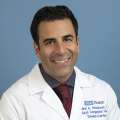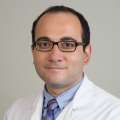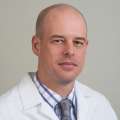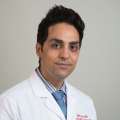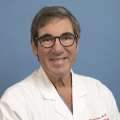UCLA Hypertrophic Cardiomyopathy Clinic
Find Your Care
The UCLA cardiovascular team cares for all types of heart and vascular conditions. Call 310-825-9011 to connect with a cardiovascular customer care specialist.
Overview
Hypertrophic cardiomyopathy — a thickening of the heart muscle — can obstruct the flow of blood to the body and is associated with disturbances in the heart’s electrical signals. It is the leading cause of sudden cardiac death in young athletes and is among the more common inherited cardiovascular diseases, affecting approximately one person in 500. While some patients are asymptomatic, others may experience chest pain, shortness of breath, fatigue, palpitations, light-headedness, dizziness and blackouts. Complications can include arrhythmias (atrial fibrillation and ventricular tachycardia), endocarditis (infection of the heart) and sudden cardiac death. Although symptoms or an abnormal electrocardiogram may indicate hypertrophic cardiomyopathy, a definitive diagnosis is made via echocardiogram or other imaging study techniques. Because of its genetic component, first-degree relatives of those who have the condition should also be screened.
The UCLA Division of Cardiology and Ahmanson-UCLA Cardiomyopathy Center offer a comprehensive hypertrophic cardiomyopathy program with a team of experts dedicated to the diagnosis and treatment of this complex condition. Cardiologists who focus on the disorder collaborate closely with cardiac imaging specialists, interventional cardiologists, electrophysiologists and surgeons to offer a full range of treatments. UCLA genetics experts provide pedigree analysis and genetic counseling to expand the scope of care to include family members who may share this inherited condition. The UCLA Division of Cardiology and Ahmanson-UCLA Cardiomyopathy Center offer patients with the full range of heart disorders comprehensive care that is rated among the nation’s best in the latest rankings by U.S. News & World Report.
Who should make an appointment with the UCLA Hypertrophic Cardiomyopathy Clinic?
Any patients:
- With established diagnosis of hypertrophic cardiomyopathy
- With unexplained systolic heart failure
- Referred from primary care provider or cardiologist
- With family history of hypertrophic cardiomyopathy
- Potentially needing heart transplantation
How will I be evaluated and treated for hypertrophic cardiomyopathy?
All patients referred in our hypertrophic cardiomyopathy will undergo comprehensive evaluation tailored to each individual patient. Each visit will conclude with patient education so that you can be informed about your disease process and treatment plan.
Services provided:
- Extensive history and physical examination
- Review of previous medical records
- Multidisciplinary evaluation
- State of the art cardiovascular imaging and diagnostic testing
- Cardiopulmonary testing to evaluate the extent of cardiac dysfunction
- Genetic testing if appropriate
- Endomyocardial biopsy if necessary
- Comprehensive multidisciplinary treatment plan tailored for each patient
- Evaluation for heart transplantation in more advanced cases of cardiac amyloidosis
Treatment Options
Management of hypertrophic cardiomyopathy can be complex and requires highly specialized expertise to determine the most appropriate therapies. Patients must be carefully assessed to determine their risk of disability or death.
UCLA offers the latest medical therapies. For patients whose symptoms persist despite medications and for patients with appropriate indications, surgical interventions, minimally invasive procedures and electrophysiologic treatments may be appropriate. Treatments include:
-
- Medications These include beta-blockers, calcium antagonists and disopyramide, which can reduce symptoms by helping the heart pump more efficiently.
- Myectomy An open-heart surgery performed to remove the buildup of muscle along the exterior of the septum, a portion of the heart that separates the left and right ventricles.
- Ablation procedures When abnormalities of the heart’s electrical signals create heart rhythm disturbances, electrophysiologists can perform ablation procedures.
- Alcohol septal ablation A safe and effective alternative for patients who are poor candidates for surgery. The minimally invasive procedure involves infusing a small amount of pure alcohol into the artery that supplies the upper septum, destroying excess tissue. Patients typically return home after three days with minimal risk of significant complications. About 5 percent of patients will require a permanent pacemaker following this procedure.
- Defibrillator procedure For patients at high risk of sudden death, a defibrillator (ICD) can be implanted under the skin in the chest. The ICD continually monitors the heart’s electrical impulses and delivers an electric charge when needed to jolt the heart back to a normal pattern of impulses.
Contact
310-825-8816 or Request an appointment
Locations
UCLA Westwood Campus
Our Expert Team

